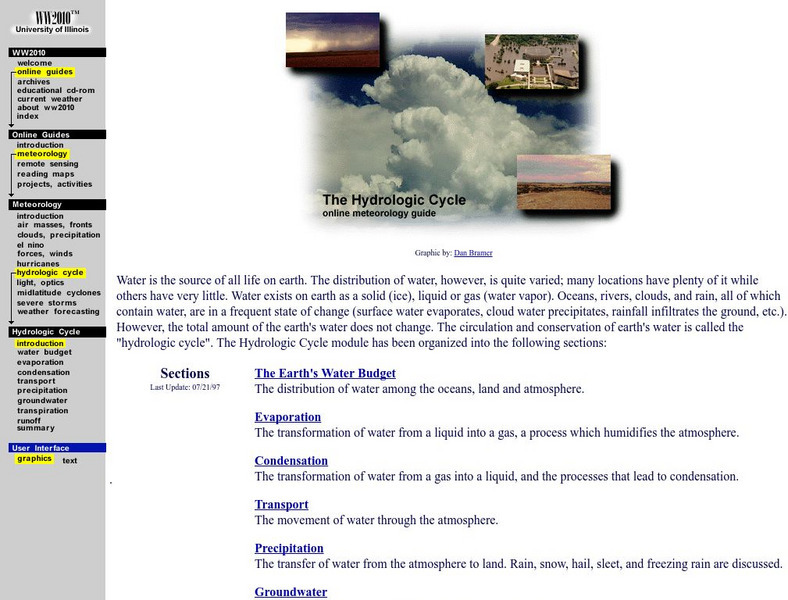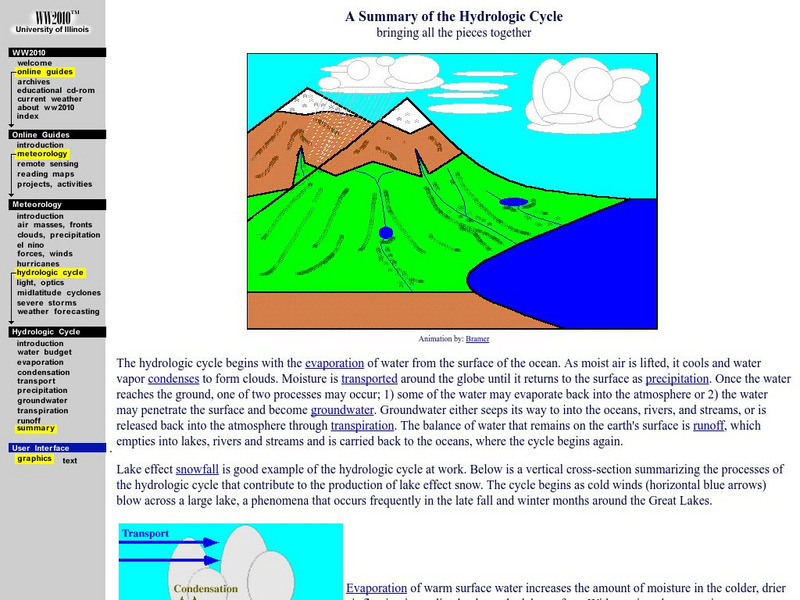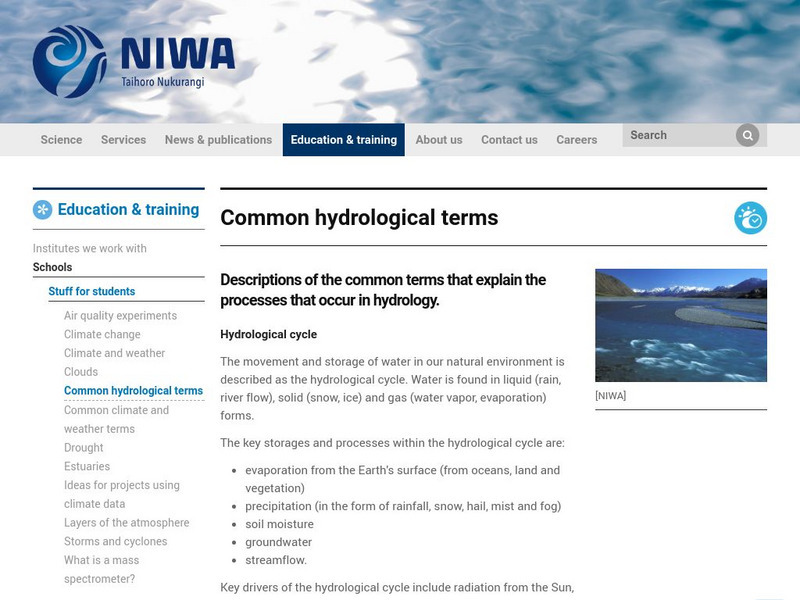University of Illinois
University of Illinois Urbana Champaign: The Hydrologic Cycle
Water is the source of life on earth. It exists in many forms and is constantly changing. The circulation and conservation of earth's water is called the hydrologic (or water) cycle. Find out how water evaporates, condensates,...
US Geological Survey
U.s. Geological Survey: What Is the Water Cycle?
A quick summary of the water cycle that includes a diagram of the cycle, with links to in-depth explanations of each component of the cycle. Click "water-cycle home" to access water-cycle resources in a variety of languages.
University of Illinois
University of Illinois Urbana Champaign: A Summary of the Hydrologic Cycle
Animation and text explain the water--or hydrologic--cycle, which is the process that water undergoes in nature.
Center for Educational Technologies
Earth Science Explorer: The Water Cycle
This is a very brief overview of the water cycle, but it does have a nice graphical representation.
Simon Fraser University
Chem1 Virtual Textbook: The Hydrosphere and the Oceans
As part of the General Chemistry Virtual Textbook, this site examines a variety of topics related to the hydrosphere and the oceans. Topics covered include where the water came from, the hydrologic cycle, Oceanic circulation, atmospheric...
CK-12 Foundation
Ck 12: Earth Science: Processes of the Water Cycle Study Guide
[Free Registration/Login may be required to access all resource tools.] This study guide summarizes key points about the water cycle. Includes a few questions to check for understanding.
Annenberg Foundation
Annenberg Learner: Weather: The Water Cycle
An article about the water cycle and the role that water plays in cloud formation.
National Weather Service
National Weather Service: Jet Stream: The Atmosphere
Learn about the atmosphere, it's make-up, the layers, the hydrologic cycle and more. The National Weather Service presents this site, including learning lessons and review questions.
US Geological Survey
Mercury in the Geochemical Cycle
Mercury in the geochemical cycle ultimately affects the food chain. Learn about this and its effect on the Everglades.
NOAA
Noaa: National Weather Service: Simplified Hydrologic Cycle
The National Weather Service offers information on the processes that make up the water (hydrologic) cycle, including evaporation and transpiration, precipitation, run-off, infiltration, and percolation. Has a good illustration and...
Other
New Jersey Section of the American Water Works Association: The Water Cycle
Simple diagram and explanations of the water cycle and related terms.
US Geological Survey
Usgs: The Usgs Water Science School
Use this site as a resource to learn about the many aspects of water.
Indiana University
Indiana Univ.: Global Energy Transfer, Atmosphere and Ocean Circulation, Climate
A course lecture on the external processes that shape the Earth, specifically the hydrologic system. This system is powered by the Sun's energy. The components of the Earth's energy budget are described, and how these drive the movement...
Science Struck
Science Struck: Water Cycle: An Easy Explanation for Kids
Provides a simple explanation of the water cycle by describing four main stages - evaporation, condensation, precipitation, and collection. Includes three project ideas and some interesting facts.
Science Struck
Science Struck: Water Cycle Diagram
Describes the four main stages of the water cycle - evaporation, condensation, precipitation, and collection.
Other
Niwa: Common Hydrological Terms
A glossary of terms that describe the processes that occur in hydrology. Glossary explains evaporation, precipitation, soil moisture, groundwater, and stream flow.
US Geological Survey
Usgs: How Much Water Is There on (And In) the Earth?
The USGS gives an overview of the amount of water on Earth and where it is located. It gives a few interesting facts about the Earth's supply of water. Click Home to access the site in Spanish.
Other
Northern Michigan University: Clouds and Precipitation
Find out about the Hydrologic or Water Cycle - precipitation, rain, sleet, hail, snow, and clouds are explained with accompanying illustrations.
US Geological Survey
U.s. Geological Survey: Where Is Earth's Water Located?
Find out how much of the water on Earth is actually usable by humans, and where the rest of it is located. Learn where our water comes from and why it never runs out. Click Home to access the site in Spanish.









